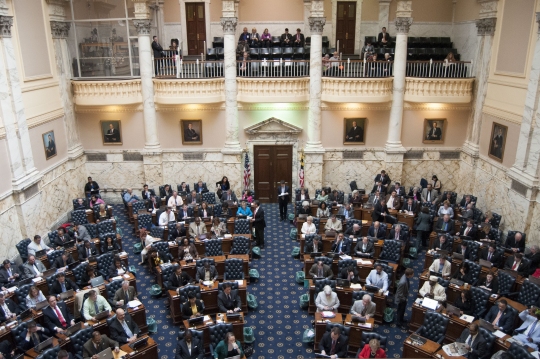 Legislators and spectators inside the Maryland State House in Annapolis. A team of bi-partisan public servants are proposing legislation that would bring a C-SPAN-like service to Maryland. (Photo: MarylandReporter.com)
Legislators and spectators inside the Maryland State House in Annapolis. A team of bi-partisan public servants are proposing legislation that would bring a C-SPAN-like service to Maryland. (Photo: MarylandReporter.com)ANNAPOLIS (Jan. 29, 2016)—A conservative Republican leader and one of the most liberal Democrats in the House of Delegates are co-sponsoring legislation that would require video streaming of all sessions of the House and Senate and their committees, including voting sessions.
The bill, HB316, sponsored by House Minority Whip Kathy Szeliga, a Baltimore County delegate running for U.S. Senate, and Del. David Moon, D-Montgomery County, faces likely opposition from Senate and House Democratic leaders who have blocked video of floor sessions and the crucial committee voting sessions.
The bill adds just 37 words to the state government article in the Maryland code.
"The General Assembly shall make available to the public live and archived video streaming of each meeting of the Senate, the House, and a standing committee, including any hearings or voting sessions held by a standing committee."
What’s online now
Video of committee hearings and briefings have been available in the House for years, and video was added to the audio of Senate committee meeting last year.
Audio has been available for floor sessions in the House and Senate chambers for many years. But rules in both houses forbid the use of personal names, so if you don't recognize the voice of "the senator from Montgomery County," or "the floor leader" or "the sponsor of the amendment," or any other of hundreds of euphemisms, you cannot tell who is speaking.
Controversy in 2013
There was a major controversy in 2013 when the then-chairman of the Senate Judicial Proceeding Committee, Brian Frosh, now the attorney general, allowed audio transmission of the voting session on the Firearms Safety Act, the major gun-control bill that had attracted thousands of pro-Second Amendment witnesses.
In 2013, the Senate Rules Committee and later the full Senate rejected 41-6 a proposal by then-Sen. Allan Kittleman, now the Howard County executive, to record discussions of bills during voting sessions.
No recording allowed
Most committees operate under rules like this one posted for the current House Appropriations Committee: "Committee voting sessions are not recorded, nor is recording permitted during voting sessions."
Moon, who strongly favors openness and transparency by public bodies, said he would be happy to have video of floor proceedings, but went along with Szeliga's broader requirement on committee voting sessions. He also noted that the bill has been assigned to the House Rules Committee, made up largely of House Democratic leaders.
In 2014, Szeliga was one of 25 Republicans co-sponsors of the same bill, then HB177, which had a hearing, but didn't even get a vote in the House Rules Committee. Then-Delegate, now Senator Michael Hough, R-Frederick, was the lead sponsor of that bill and said Thursday he plans on filing a similar bill this session. However, he is going to leave out the requirement for video of committee voting sessions.
Costs and technology
The fiscal note on Hough’s 2014 bill, before video was installed in the Senate hearing rooms, said "the cost to upgrade equipment in the Senate hearing rooms to allow for video streaming is estimated to total approximately $1.5 to $2.0 million." The video was installed in those rooms later that year.
"Reliable estimates of the cost to upgrade equipment in the House and Senate chambers are not available," the note went on. The legislature's Office of Information Systems "advises that the Senate chamber can be upgraded with standard equipment, but that the House chamber poses challenges because of its size and tight seating arrangements."
Hough as well as Szeliga and Moon note that new video technology should make it simple and inexpensive to stream the floor session live and archive them.
Discussing the video capabilities of an iPhone with a reporter, Hough said you could probably mount iPhones in the four corners of the Senate chamber and do video streaming.


